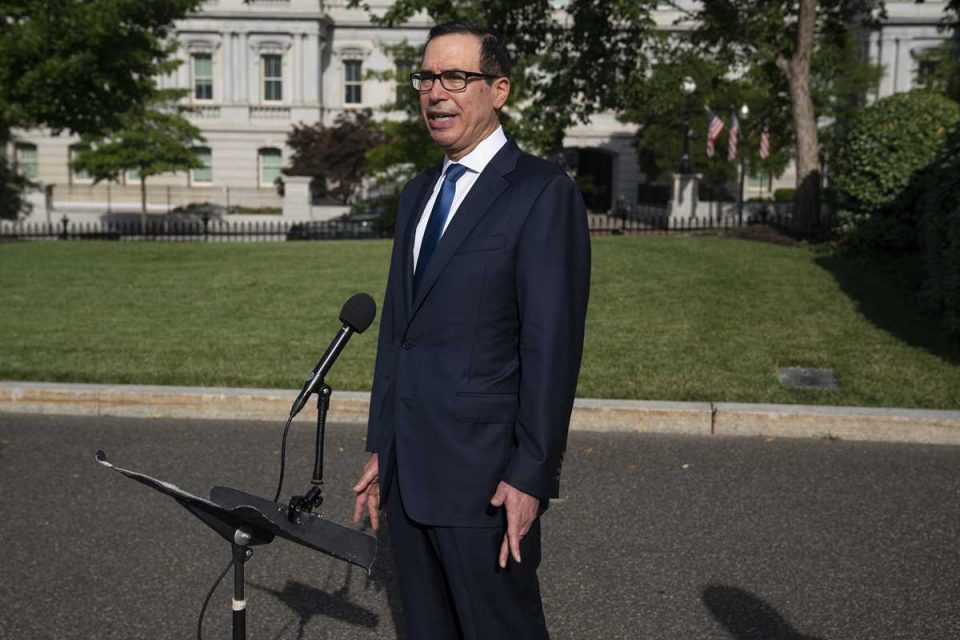WASHINGTON (AP)– The White House reluctantly dropped its bid to cut Social Security payroll taxes Thursday as Republicans prepared to unveil a $1 trillion COVID-19 rescue plan, yielding to opposition to the concept among leading Senate allies.
“It won’t remain in the base costs,” stated Treasury Secretary Steven Mnuchin, speaking about the payroll tax cut, eliminating the concept in the meantime. The cut in the tax that funds Social Security and Medicare has been a major demand of President Donald Trump.
“The president is focused on getting money rapidly to workers right now, and the payroll tax takes time,” Mnuchin stated at the Capitol. Only Sunday, Trump said in a Fox News interview that “I would consider not signing it if we don’t have a payroll tax cut.”
The long-delayed legislation comes in the middle of worrying advancements on the infection crisis. It was originally to be launched Thursday morning by Senate Bulk Leader Mitch McConnell, but the Kentucky Republican politician rather hosted an unscheduled meeting with Mnuchin and White Home Chief of Personnel Mark Meadows and postponed the prepared release of his proposal.
Later, Mnuchin declared the administration had reached an “essential arrangement” with Senate Republicans.
Provided the hold-up, however, Mnuchin and Meadows drifted the concept of breaking off a smaller sized bill that would be restricted to maintaining unemployed benefits that would otherwise expire and speeding aid to schools. Democrats instantly panned that concept, stating it would strand other essential elements like aid to state and city governments.
“We can not piecemeal this,” stated House Speaker Nancy Pelosi of California.
McConnell’s $1 trillion plan is an opening GOP quote in talks with top Capitol Hill Democrats– who back a $3.5 trillion House bill that passed two months ago– in a negotiation that might be rockier than talks in March that produced a $2 trillion rescue plan. GOP senators and Trump are at odds over top priorities, and Democrats state the Republican strategies are not nearly adequate to stem the health crisis, resume schools and extend help to unemployed Americans.
“Our Republican colleagues have been so divided, so disorganized, therefore unprepared that they need to have a hard time to draft even a partisan proposition within their own conference,” said Democratic leader Chuck Schumer.
The must-have centerpiece for McConnell is a liability guard to safeguard services, schools, and others from coronavirus-related suits.
The plan is not expected to provide any brand-new money for cash-strapped states and cities, which are demanding funds, however, Republicans propose offering $105 billion to help schools reopen and $15 billion for childcare centers to produce safe environments for youngsters throughout the pandemic.
The GOP step does forge an instant contract with Democrats on another round of $1,200 checks to most American grownups.
The $ 600 weekly welfare boost that is ending Friday would be cut down, and Mnuchin stated it would eventually be revamped to provide a normal employee 70% of his or her income. Republicans state continuing the $600 benefit as Democrats is a disincentive to work, however, some Republicans are pushing for a short-lived extension of the present advantage if the talks drag.
“We can not allow there to be a cliff in unemployment insurance provided we’re still at about 11% joblessness,” stated Sen. Rob Portman, R-Ohio.
The plan will likewise consist of tax breaks for services to employ and maintain employees and to help shops and offices retool with brand-new security protocols. A file circulating amongst lobbyists claims the package would increase the reduction for serving meals to 100%, providing aid to the restaurant market.

Mnuchin said there is bipartisan agreement on modifications to a popular aid program for companies called the Paycheck Protection Program that would allow services specifically hard hit by the pandemic– companies with less than 300 workers with earnings losses of 50%– to get a 2nd PPP payment.
The development of $25 billion in testing cash was essential after days of debate between Republicans and the White Home. There will also be $26 billion for vaccines and $15 billion for research study programs at the National Institutes of Health.
Of the $105 billion for education, Republicans want $70 billion to help K-12 schools resume, $30 billion for colleges, and $5 billion for guvs to designate. The Trump administration desired school cash connected to reopenings, however, in McConnell’s package the cash for K-12 would likely be split between those that have in-person knowing and those that do not.
In their bundle, Democrats are calling for $430 billion to resume schools, larger joblessness advantages, and direct aid checks, and a sweeping $1 trillion for state and city governments. They also want a fresh round of home mortgage and rental help and new federal health and wellness requirements for employees.
McConnell calls his proposal a “beginning point” in settlements with Democrats. Congress in March authorized the enormous $2.2 trillion CARES bundle, the most significant of its kind in U.S. history.
The severity of the extended infection outbreak is upending American life. Schools are delaying fall openings, states are clamping down with new stay-home orders and the fallout is rippling through an economy teetering with high unemployment and company unpredictability. A brand-new AP-NORC survey reveals really couple of Americans want full school sessions without limitations in the fall.
Still, some Republicans said they were not likely to vote for any new aid.
“I simply don’t see the requirement for it,” Sen. Ron Johnson of Wisconsin informed reporters on Wednesday.

